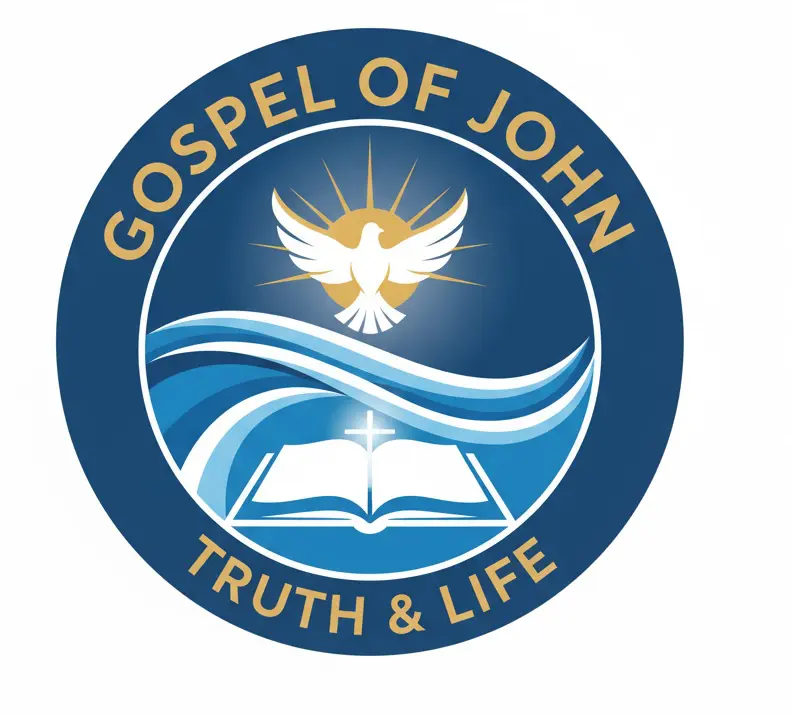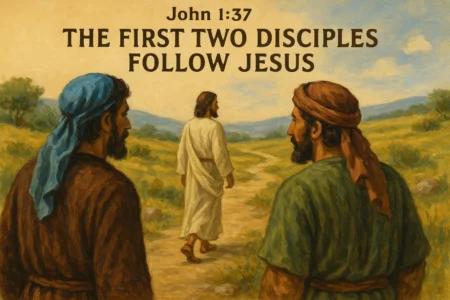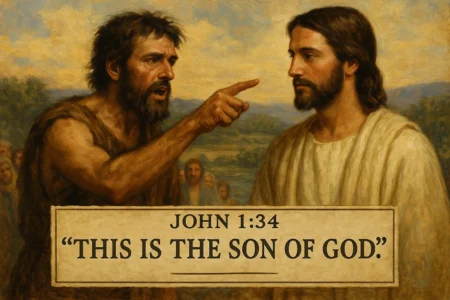We’re all looking for something.
It’s the great, unspoken truth of being human, isn’t it? We wake up each day with this deep, often unnamed, drive. A hunt. We seek success. We seek security. We seek connection, peace, or maybe just a single minute to catch our breath. We chase promotions, new relationships, and bigger experiences, all of it driven by the hope that this time, this will be the thing. The thing that finally makes us feel whole.
And right into that universal, restless search, the Gospel of John opens with a scene of stunning simplicity. Two men, disciples of the fiery prophet John the Baptist, hear their teacher point to a passing man and declare, “Behold, the Lamb of God!”
Curiosity ignites. They begin to follow this man, Jesus.
He notices them. He turns. And then He speaks His very first words in this entire Gospel.
He doesn’t start with a sermon. He doesn’t issue a command. He doesn’t even introduce Himself.
Instead, He looks right at them—and by extension, right at us—and asks the single most important question of our lives: “What are you seeking?”
This question, found in John 1:38, is so much more than a simple query. It’s an invitation. It’s a challenge. It’s a mirror held up to the human soul. Exploring the deep John 1:38 meaning reveals the starting point of any real spiritual journey. It’s the question that, if we’re brave enough to truly answer it, can change absolutely everything.
More in John Chapter 1 Category
Key Takeaways
- Jesus’ First Words: John 1:38 contains the first spoken words of Jesus in the Gospel of John: “What are you seeking?” (Greek: Ti zēteite?).
- The Disciples’ Motive: The question is designed to make the disciples—and the reader—stop and examine their true motives for following Him.
- A Deeper Answer: The disciples’ response, “Rabbi, where are you staying?”, is not a logistical question. It’s a profound request for relationship, time, and intimate discipleship.
- The Invitation: Jesus’ reply, “Come and you will see,” is the essence of the gospel. He offers an experiential faith, a personal encounter, not just a set of rules or doctrines.
- The Personal Challenge: This question echoes through time, forcing each of us to confront what we are really looking for in life and in our pursuit of God.
What Was Happening Right Before Jesus Asked His First Question?
To really get the weight of this moment, you have to feel the static in the air. This wasn’t just a casual walk by the river. Judea was a powder keg. The people were oppressed by Rome and desperate for a deliverer, a Messiah. The expectation was so thick you could taste it.
Into this tension steps John the Baptist. This guy was a character—all camel hair, wild honey, and fiery preaching. He pulled no punches. He was the man of the hour, and these two disciples—Andrew and almost certainly John, the author of this Gospel—had dedicated their lives to his ministry. They were all in.
Then, the day before our verse, John the Baptist sees Jesus and makes a stunning public declaration: “Behold, the Lamb of God, who takes away the sin of the world!” (John 1:29). This is theological dynamite. He’s not just calling Jesus a good teacher; he’s calling Him the ultimate sacrifice, the fulfillment of all their hopes.
The next day, John is standing with Andrew and the other disciple. He sees Jesus walking by again and repeats it, quieter this time, more personal: “Behold, the Lamb of God!” (John 1:36).
This time, it lands.
The two disciples hear this, and something just clicks. This is it. This is the One John was preparing them for. Without a word, they leave their master and begin to follow Jesus. They are literally “changing masters” based on John’s testimony. It’s this quiet, world-changing decision. They are walking away from the life they knew to pursue… what? They probably couldn’t even articulate it yet.
They just knew they had to follow.
Why is “What Are You Seeking?” Such a Profound First Question?
Jesus turns and sees them following. He could have said anything.
“Hello.” “Can I help you?” “Why are you tailing me?”
But He doesn’t. He asks, “What are you seeking?”
Just think about that for a second. He’s not asking who they are. He’s not asking what they believe. He’s asking about their motive. He cuts straight past all the superficial stuff and goes directly to the heart. It’s a question that bypasses all our practiced religious answers and demands uncomfortable honesty.
He asks this question because He knows we are always seeking. The human heart is a seeking machine. It’s what we do. The problem is, we usually seek the wrong things, or we seek the right things in all the wrong places. We seek happiness in temporary pleasures. We seek validation in the approval of others. We seek security in our bank accounts.
Jesus’ question forces us to stop, take a breath, and actually name the desire that’s pulling our strings.
Is Jesus Asking About Their Needs or Their Desires?
That’s a brilliant question. The answer is: both.
The Greek word zēteite is a rich, active, and gutsy word. It means “to seek,” “to search for,” “to desire,” “to aim at.” It’s the same word used for seeking hidden treasure or trying to solve a deep mystery. It implies a purposeful, and perhaps even desperate, hunt.
On one level, the disciples were seeking a need. They needed a Messiah. Their people needed deliverance. They needed answers to the chaos and oppression of their time.
But on a deeper level, they were driven by desire. They desired hope. They desired purpose. They desired something more than the life they had. They were spiritually restless. Starving, even.
Jesus’ question is broad enough to cover all of it. He’s asking, “What is the ultimate ‘what’ that you believe will satisfy the deepest, truest longing of your soul?”
How Does This Question Reflect Our Own Search for Meaning?
This question isn’t just for them. It’s for us. Today. When you boil it all down, what are you really after?
I remember my first year of college. Man, what was I seeking? A degree, sure. A good job, hopefully. Fun, definitely. I threw myself into everything—my classes, new friendships, weekend parties, clubs. I was busy. I was “seeking.” But in the quiet moments, like walking back to my dorm late at night, I’d feel this… hum. This constant, nagging emptiness. I was just… restless. I was seeking, but I didn’t even know what for.
That’s precisely where these disciples were. They were restless. They had been following John, but now John himself had pointed to someone greater. Their restlessness had a new target.
We are all in that same boat. We fill our lives with activity, with goals, with noise, all in an effort to satisfy that deep, unnamed seeking. And Jesus stands in the middle of our frantic search, turns, and gently asks, “What is it you really want?”
Why Didn’t They Just Answer His Question?
Here’s where the encounter gets truly fascinating. Jesus asks a direct, profound question, and the disciples… just don’t answer it.
At all.
They don’t say, “We are seeking the Messiah.” They don’t say, “We are seeking the truth.” They don’t say, “We are seeking to be your disciples.”
Instead, they respond to His question with a question of their own: “Rabbi (which means Teacher), where are you staying?”
On the surface, this sounds like a total dodge. Or maybe just a socially awkward attempt to change the subject. But it is one of the most brilliant and profound non-answers in all of scripture.
They couldn’t articulate what they were seeking. Why?
Because the what they were seeking was actually a who.
They instinctively knew that the answer to their search wasn’t a concept, or a philosophy, or a new set of rules. The answer was Him. Their deep, restless search had led them to a Person, and now their only goal was to be with that Person.
What Does “Where Are You Staying?” Really Mean in This Context?
This is not a real estate question. They aren’t asking for His address so they can swing by for tea later.
The Greek word for “staying” is meneis. This word is one of the most important theological terms in John’s entire Gospel. It means “to stay,” “to remain,” “to abide,” “to dwell.”
This is the exact same root word Jesus uses in John 15 when He says, “Abide in me, and I in you… Whoever abides in me and I in him, he it is that bears much fruit” (John 15:4-5).
When Andrew and John ask, “Where are you abiding?”, they are asking something incredibly deep. They are asking, “Where do you live?” “Where do you dwell?” “Where is the center of your life, and how can we be there with you?”
It’s a request for discipleship. It’s a request for relationship. It’s a request for life.
They are essentially saying, “We don’t know how to answer ‘what are you seeking.’ We just know that we want to be where you are. We want to ‘abide’ with you.”
They were seeking a relationship, not just information. And that, right there, is the heart of true Christianity.
“Come and See”: Why Is This Invitation the Heart of the Gospel?
Jesus’ response to their question is as perfect as His initial query.
He doesn’t give them an address. He doesn’t launch into a long lecture about the nature of abiding. He doesn’t quiz them to see if they’re worthy.
He gives them a simple, two-word invitation: “Come and you will see.”
This is it. This is the entire Gospel in two words.
He doesn’t say, “Come and memorize these doctrines.” He doesn’t say, “Come and perform these rituals.” He doesn’t say, “Come and I’ll explain everything.”
He says, “Come and see.”
He invites them into His life, into His personal space, into an experience. This is the essence of faith. It’s not about blind belief. It’s about an encounter. It’s an invitation to “taste and see that the Lord is good.”
Is Jesus Offering an Experience Instead of an Explanation?
Absolutely. And this is a critical distinction that so many of us miss. We often want God to give us all the explanations first. We want Him to explain suffering. We want Him to explain why our prayers aren’t answered the way we want. We want a tidy, intellectual system that makes sense of everything.
But Jesus has always been more interested in relationship than in rules. He offers an experience, not a sterile explanation.
The text says, “They came and saw where he was staying, and they stayed with him that day, for it was about the tenth hour.” (John 1:39).
They spent the day with Him. The Gospel doesn’t record what they talked about. It doesn’t tell us what they ate or what wisdom He shared. It just tells us they stayed with Him.
And that one day, that one personal experience, changed them forever. This encounter-based faith is central to the Christian message. As one theologian at Gordon-Conwell Theological Seminary points out, this question is a call to a journey, not a destination. It’s a call to come and experience the answer.
What Happened Immediately After They “Came and Saw”?
The proof of their transformation is in what happens next. The ripple effect is immediate and powerful.
The text tells us that one of the two men was Andrew, the brother of Simon Peter. What is the very first thing Andrew does after spending the day with Jesus?
“He first found his own brother Simon and said to him, ‘We have found the Messiah’ (which means Christ).” (John 1:41).
Look at that progression!
- The Question: “What are you seeking?”
- The Invitation: “Come and see.”
- The Experience: “They stayed with him that day.”
- The Revelation: “We have found the Messiah.”
The experience gave them the answer. Their vague, restless “seeking” was given a name: “Messiah.” They went from seeking to finding, not because Jesus handed them a pamphlet, but because they spent time with Him. They saw for themselves. Their faith was now based on their own personal, firsthand experience.
How Did One Question Lead to Finding the Messiah?
This is the pattern for genuine discipleship. It all starts with that honest, probing question: “What do you want?”
When Jesus asks this, He isn’t trying to trick us. He is trying to help us. He is inviting us to clear away the clutter of our lesser desires so we can discover the one, true desire underneath them all: the desire for God Himself.
The John 1:38 meaning is a roadmap.
- It begins with an honest admission of our own restless seeking.
- It moves to a realization that the answer is not a what, but a who.
- It leads us to ask, “Where are you staying?”—a desire to be with Him.
- It climaxes with His open invitation: “Come and see.”
How Does Jesus’ 2,000-Year-Old Question Apply to Me Today?
This isn’t just a historical event. It’s a present-day reality. The question still echoes. The John 1:38 is not just for two disciples by the Jordan River; it’s for you, in your car, at your desk, in your kitchen.
When we open our Bibles, Jesus is asking, “What are you seeking? Are you looking for ammo for an argument, or are you looking for Me?”
When we go to church, He is asking, “What are you seeking? Are you here for the music, the community, a feeling of moral comfort, or are you here for Me?”
When we pray, He is asking, “What are you seeking? Are you just giving me your wish list, or are you seeking my presence?”
Are We Brave Enough to Answer Honestly?
This is a scary question because, if we’re honest, our motives are often shallow.
I’ve been a Christian for a long time. For years, I thought I was seeking God. But if I’m brutally honest, I was often seeking things from God. I was seeking blessings. I was seeking a comfortable life. I was seeking validation. My prayers often sounded like a spiritual shopping list.
It took a hard season in my life—a sudden job loss that shook me to my core—to realize I had been answering Jesus’ question all wrong. I was seeking the gifts, not the Giver. My “seeking” was all about me.
That’s when the John 1:38 meaning truly hit me. I had to learn to stop asking God, “Why is this happening?” and “Where are my blessings?” I had to learn to ask the disciples’ question: “Rabbi, where are you staying?”
I just wanted to be with Him, even if everything else fell apart. That’s when His answer, “Come and see,” became my lifeline.
Here are some of the things we often seek instead of Him:
- Religious validation: We want to feel like we are “good people.”
- A quick fix: We want Jesus to be a cosmic vending machine for our problems.
- A community: A sense of belonging is a wonderful thing, but it’s not the ultimate thing.
- Intellectual answers: We want a belief system that is tidy and answers every question.
None of these are necessarily bad. But they are byproducts, not the goal. The goal is simply Him.
What If I Don’t Know What I’m Seeking?
Maybe you’re reading this and you feel that restlessness, but you have no idea what to call it.
That’s okay.
The disciples didn’t know either! Their answer, “Where are you staying?”, was a beautiful and honest way of saying, “We don’t know what we’re seeking, but we’re pretty sure You are the answer. We just want to be near you.”
If you feel lost, confused, or just vaguely empty, you are in the perfect position to have this encounter. Your restlessness is your starting point.
The invitation to you is the same. “Come and see.”
So, how do we “come and see” in our modern lives?
- Engage with Scripture: Read the Gospels, not just as an ancient text, but with a simple prayer: “Jesus, show me who you are.”
- Practice Presence in Prayer: Spend five minutes in silence, not asking for anything, but simply focusing your heart on the fact that God is with you.
- Find Genuine Community: Connect with other believers who talk about their faith as a real, active relationship, not just a set of traditions.
- Take a Small Step: Act on one of the things He taught. Choose to forgive someone. Give generously. Serve someone in need. Do the faith, and you will see the reality.
The Question That Never Ends
The first words of Jesus in John’s Gospel are not a doctrine to be memorized. They are not a law to be obeyed. They are a question to be lived.
It’s a question that cuts through all our pretense, all our religious activity, and all our frantic running around.
It’s the question that unlocks everything.
The entire Christian life is contained in this one, short scene. It’s the journey from restless seeking to a personal encounter. From a vague “what” to a specific “who.” From “What do you want?” to “We have found the Messiah.”
The good news of the John 1:38 is that Jesus asks this question not to condemn us for our shallow desires, but to invite us into a deeper one. He’s not angry that we’re seeking. He just wants to direct our seeking to the only One who can truly satisfy it.
He’s turning and looking at you right now. He sees you following, trying to figure this all out.
And He’s asking, with all the love in the universe:
“What do you want?”
FAQ – John 1:38 Meaning
What is the significance of Jesus asking ‘What are you seeking?’ in John 1:38?
The question ‘What are you seeking?’ is Jesus’ first spoken words in the Gospel of John, and it serves as an invitation for self-examination, challenging individuals to consider their deepest motives and desires in following Him.
Why do the disciples respond with a question rather than answering Jesus directly?
The disciples respond with a question about Jesus’ location because their true desire was for a relationship and to stay close to Him, not just to find out information; it reflects their longing to abide with Him.
What does the phrase ‘Where are you staying?’ mean in the context of John 1:38?
‘Where are you staying?’ uses the Greek word ‘meneis,’ meaning ‘abide’ or ‘dwell,’ signifying a desire to remain in close relationship with Jesus, seeking to abide in Him.
How is the invitation ‘Come and see’ the core message of the Gospel?
‘Come and see’ is Jesus’ simple invitation to experience a personal encounter with Him rather than just learning about Him intellectually, emphasizing relationship and personal experience as the essence of faith.





